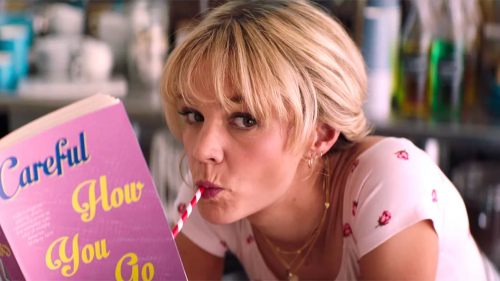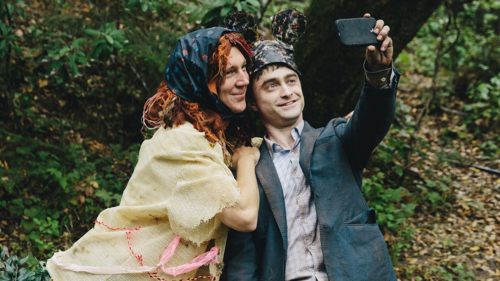WILDLIFE Review: Pretty As A Picture
Wildlife opens with a father and son playing catch on their front lawn before transitioning into what seems like an otherwise normal family dinner. Fourteen-year-old Joe Brinson (Ed Oxenbould) boasts that the math book they're using in class this year is the same as the one they used last year, and his mother Jeanette (Carey Mulligan) tells him that he should inform the teacher, as to not be wasting his (or the class’) time. His father Jerry (Jake Gyllenhaal) interjects, saying that the kid should keep quiet, because if Joe doesn't speak up, then he's automatically "ahead", and can coast while the rest of his peers sweat it out, attempting to solve problems Joe already has the answer to.
It's a seemingly innocuous mealtime conversation held at a working class dinette table that tells you everything you need to know about these Americana archetypes. Jerry looks for short cuts to success, while Jeanette extols the virtues of honesty and hard work. Caught in the middle is Joe, who obviously admires both of his parents, yet isn't sure which lesson he should take to bed with him. His dad's a proud but somewhat lazy stiff, placing minor bets with the members at a country club where he works as a pro, while Jeanette re-writes checks for their expenses after the originals bounce. Following Jerry's firing for "overstepping with the customers", Jeanette tries to go back to work (despite having a husband who desires she remain a stay-at-home wife/mother) while the “man of the house” refuses to bag groceries to help his brood get by. Joe’s too proud to get paid for tasks a teenager should be performing, but the market in their Montana mountain town isn't exactly flourishing, either.
Adapting Richard Ford's novel of the same name with partner Zoe Kazan, Wildlife is Paul Dano's feature directorial debut: an assured formal exercise that nevertheless feels painfully familiar, narrative and thematically speaking. The painterly fashion in which cinematographer Diego García (Cemetery of Splendor) frames every scene marks Wildlife as a beguiling visual experience, the golden hour lensing and period garb blending together perfectly, becoming portraits of Rockwellian melancholy. Nevertheless, the corrosion occurring at the center of each gorgeous tableau feels recycled from much better dramatic works, ranging from Ang Lee's The Ice Storm to Matthew Weiner’s episodic touchstone Mad Men. In short, we've seen these faded family photos before, and more thoroughly realized.
Still, no amount of storytelling familiarity can stop Mulligan from delivering one of the stronger performances in her already superb career. We get a sense that Jeanette has been wearing a mask for her entire life, as when we first meet the woman, she's the perfectly manicured homemaker doubling as a steadfast rock for her fuck-up of a husband. This costume of conformity slowly slips off as she's left to fend for herself. Jerry enlists to fight fires for pennies off in the hills, and Jeanette discovers that she might be better off without him. Desperately watching bills pile up and unable to obtain any sort of gainful employment, she assumes the form of a potential concubine for Warren Miller (Bill Camp), a rich widower who’s disturbingly content to try and bed this married woman, even in front of Joe. But no matter which "version" of Jeanette we're witnessing, Mulligan instills the character with a jittery unease, as if she’s constantly learning to find comfort in her own skin.
For Oxenbould, Joe is surprisingly something of a thankless role, despite essentially being the eyes through which we see this relationship completely collapse. Instead of gifting Joe much of a personality, Oxenbould is instead asked to deliver a variety of quiet reaction shots, his warm, cherubic face used as a stark juxtaposition against the cold, harsh realities that have become his parents' lives. He's not bad, per se; rather, you wish that the movie granted the kid any sort of interior life beyond the obvious for Oxenbould to explore, as the impact this burgeoning affair he witnesses seems to only elicit the usual moralistic quandaries and condemnations we've come to expect from this sort of tale.
Though he essentially disappears for roughly 2/3 of the movie's mercifully brief 104-minute runtime, Gyllenhaal still manages to create a complete human being in Jerry: an avatar for antiquated masculinity who silently drinks beers on the couch and smokes cigarettes in the backyard after fights with Jeanette. It's a far less flashy turn than we've grown accustomed to from this talented actor, as we practically watch Gyllenhaal internalize every single one of Jerry's emotions, until he becomes another placid pretty thing to observe in this moving art gallery. Thankfully, Dano and Kazan's script allows him to explode just before Wildlife lulls us into submission, via an uncomfortable scene where Jerry probes Joe for details about Jeanette's fling, ending in a literally fiery showdown.
There's a rather on the nose metaphor employed in Wildlife that sums up this writer's main issue with the movie, as Joe obtains his first job taking smiling family portraits at a local studio. The kid excels in the position, even earning a promotion thanks to the dutifully symmetrical shots he snaps for the clans who want to preserve their manufactured joy for years to come. But that's really all Wildlife is in the end: a picture perfect example of competency behind the camera on Dano's part, sure to earn critical lauds and ensure that he eventually makes another movie. Sadly, there's nothing really ingénue being said with these exacting illustrations of long-gone American life, as his bow isn't much more than an interesting vanity piece, soon to be forgotten come next the next festival season of our discontent.
Wildlife is playing in select theaters now.



